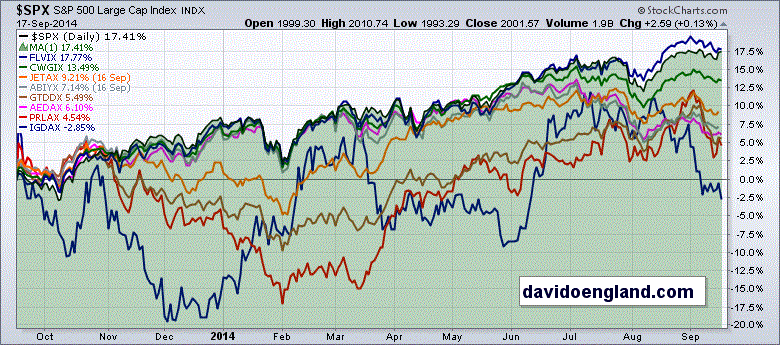Last week, I compared a portfolio of “blue-chip” stocks performance vs. the S&P 500. We saw the majority underperformed the market. Today, I compare a reader’s holdings performance vs. the S&P 500. Remember, I do not give buy or sell recommendations or tell what to buy or sell. I teach my proprietary trading systems and how to monitor your securities performance vs. investing in the market-something you will never see graphed in your monthly brokerage statement.
Some of the most important data to evaluate our securities holdings are performance charts in one, five, ten and the most important timeframe-since they were purchased. The reader is within 15 years from retirement and wanted to know the facts about his portfolio performance. I suggested an account audit to see how much his mutual funds were outperforming the market.
With today’s technology and the proper training, one can monitor their securities’ value. My favorite is the performance tool at stockcharts.com. I programmed the reader’s eight mutual fund holdings in a one-year chart. You can see the results.

The green-shaded area is the price performance of the S&P 500-17.27% in the past year. During the same time period, out of the eight securities seven are underperforming the market. I always evaluate the results in multiple timeframes to get a more accurate picture. Since the market bottomed in March of 2009, seven out of his eight funds sill underperformed the market. The reader pays one percent to have his account professionally managed. He is extremely unhappy with the lack of results from his managed account, but is glad that he has time to make changes. Many discover their holdings’ underperformance after they retire-not a good thing!
What can we learn? First, there is technology and training available to audit our holdings’ price performance. 2. Many times, what we own is not performing how we think it is. 3. Performance is not a profit or a loss reality until the transaction is closed. 4. Past performance does not dictate future returns. 5. Price performance is just one factor involved in our portfolio selection. 6. Just because investors pay a management fee to Wall Street professionals, this does not guarantee the results will always be profitable. 7. One should have an account performance audit at least once per year.
How are your securities really performing vs. just investing in the S&P 500? If you are getting closer to retirement, is it really worth the gamble not to know the facts? Do you know how to use these very useful audit/performance tools? Next week, I am auditing another portfolio. It will be interesting to see how many securities are out or underperforming the market. If you have questions, email me at the address below.
Plan your work, work your plan and learn to share your harvest!
David England,
http://davidoengland.com
